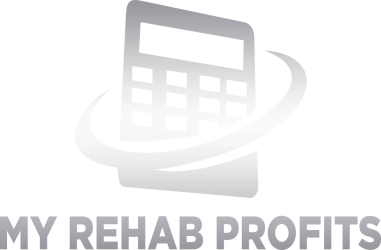Enter the interest rate on your loan. Hard money is usually between 10-15%, but lower and higher is not uncommon and depends on your financial situation. Please note below on self-funding.

Top Interest Rate Tips
- Know your options. Money is expensive, go figure.
- Hard money lenders take on more risk with their loans compared to conventional bank loans. Because of this increased risk, interest rates are higher.
- Most common forms of funding are traditional, hard money and creative. Each calculate into your COM differently.
- Good credit and a track record make all the difference, with prime interest rates as low as 7%.
- Interest rates are calculated annually but paid monthly.
- Shop around before you commit.
- Be prepared to show documents such as tax returns, VOD, employment verification, background checks, credit history, asset ownership, and a Real Estate track record.
- Legitimate hard money lenders will also require a reserve, this is on top of funds used for the downpayment. This to make sure you can make required interest payments.
- If LTV is based on ARV and includes rehab, expect interest rates between 15-18%, especially if you have a small down payment.
Self Funding
To most people this sounds like the ultimate form of funding and their ultimate destination as an investor. You might feel like you have the most control in this situation at the lowest cost, it is not free and certainly not without risk.
Self funding is calculated in terms of opportunity costs. People with substantial amounts of available liquidity usually know how to invest and get decent returns. If those returns are higher than the 7% cost of borrowed money, it is a better strategy to not self-fund.
Risk is another factor why people with money often use other people’s money to invest in real estate. While borrowing money doesn’t negate financial obligations, investors are involving others in their deals. More eyes mean reduced risk, especially if those eyes are experts. Some lenders are consultative in their lending process.
Professionals usually leverage money using Self Funding. For them, bottom line is returns and all this is simple math. Why put all your money into one deal when you can do multiple?
Funding Options
Hard Money and Creative Funding are both acceptable ways to fund deals, but both are controversial. Real Estate can be extremely lucrative, which naturally brings bad actors to the scene. Novice investors have a hard time finding legitimate lenders and partners.
Choosing between legitimate hard money and creative funding usually rests on a borrower’s finances. If you have good credit and lots of cash, legitimate hard money lenders are plenty. They also give the investor most control over the rehab. For novice investors this is usually not a good thing.
Hard Money Lenders
Hard money lenders typically care less about a borrower’s credit rating and are more concerned with the amount of equity that the borrower invests in the property, which will be used as collateral. Capital to pay the interest rate on the loan is also essential to hard money lenders.
Creative Funding
Creative Funding is usually based on a partnership, often where “sweat equity” is part of the agreement. This pools resources. Investors might live where the “money partner” doesn’t, or they might have time to manage a project. Creative funding is unique in that investors don’t receive the money and as such don’t have the costs or liability common with Hard Money and Traditional Funding. Either way, legitimate partnerships should start with some kind of an agreement. Who is doing what and who is responsible, especially financially. Typically these arrangements are contracted with a JV with some companies going the extra step to create an up-front agreement such as memberships.
Memberships are a common way to create clear agreements up-front and assure the borrower can discuss properties without the fear of losing a deal to “partners.” Always do your homework, and be critical of reviews. Expect one of the most lucrative businesses – Real Estate – to stir up emotions good and bad, and lots of competition. It makes it difficult to make an educated discussion, but not impossible.
Need more information? Everything can be obtained by searching online. This site is not specific to a particular way of flipping, it is common “industry” standards and practices only. But you are welcome to contact us – we are a members-only flipping and funding company.
Keystone Funding Network

